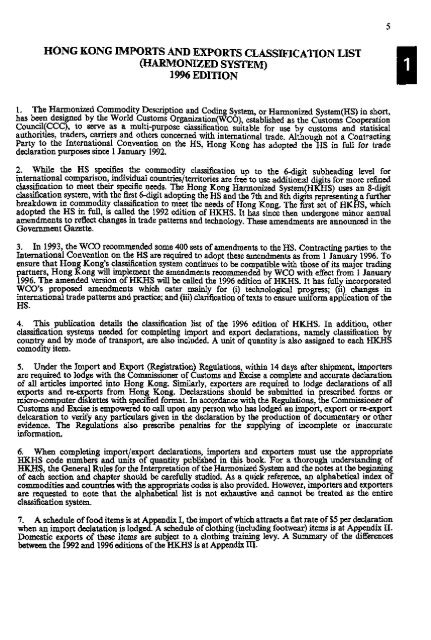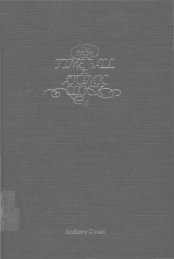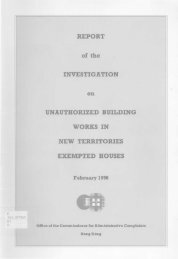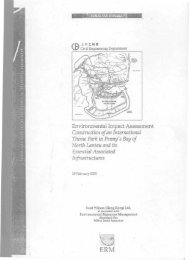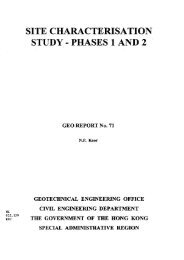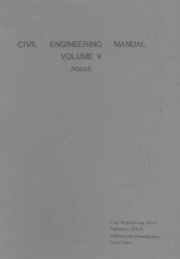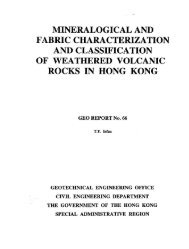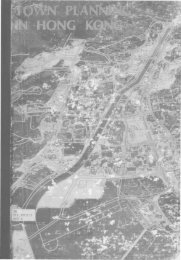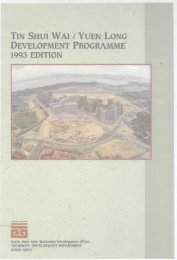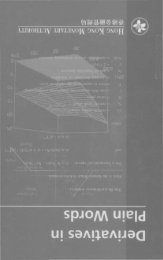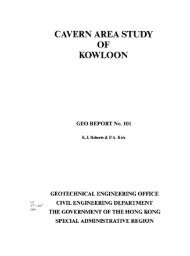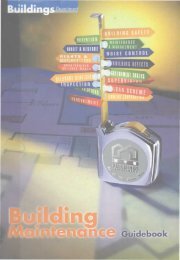- Page 2 and 3: THE UNIVERSITY OF HONG KONG LIBRARI
- Page 5: CONTENTS Page 1. Preface 5 2. Class
- Page 9 and 10: CLASSIFICATION OF COUNTRIES/TERRITO
- Page 11 and 12: Code No. 521 Saudi Arabia 522 Syria
- Page 13 and 14: 11 ALPHABETICAL LIST OF COUNTRIES/T
- Page 15 and 16: 13 Country St. Helena* St. Lucia* S
- Page 17 and 18: 15 ABBREVIATIONS OF UNITS OF QUAJNT
- Page 19 and 20: 17 GENERAL RULES FOR THE INTERPRETA
- Page 21 and 22: 19 Page 18. Cocoa and cocoa prepara
- Page 23 and 24: Page 56. Wadding, felt and nonwoven
- Page 25 and 26: 23 Page 91. Clocks and watches and
- Page 27 and 28: 25 0105 0106 HKHS code 01051100 010
- Page 29 and 30: Heading HK HS No. code Description
- Page 31 and 32: 29 Heading HKHS No. code Descriptio
- Page 33 and 34: Heading HKHS No. code Description 3
- Page 35 and 36: Heading HKHS No. code Description 3
- Page 37 and 38: 35 Heading HKHS No. code Descriptio
- Page 39 and 40: 37 Heading No. HKHS code Descriptio
- Page 41 and 42: 39 Heading HKHS No. code Descriptio
- Page 43 and 44: 41 Heading HK HS No. code Descripti
- Page 45 and 46: Heading 0908 0909 0910 HK HS code 0
- Page 47 and 48: 45 Otherwise, they fall in heading
- Page 49 and 50: 47 5. Heading No. 1209 does not, ho
- Page 51 and 52: 49 1213 1213 0000 1214 1214 1000 12
- Page 53 and 54: 51 Heading HK HS No. code Descripti
- Page 55 and 56: Heading HKHS No. code Description 1
- Page 57 and 58:
55 SECTION IV PREPARED FOODSTUFFS;
- Page 59 and 60:
57 Note. 1. This Chapter does not c
- Page 61 and 62:
Chapter 19 59 Preparations of cerea
- Page 63 and 64:
Subheading Notes. 1. For the purpos
- Page 65 and 66:
63 Notes. 1. This Chapter does not
- Page 67 and 68:
Subheading Note. 1. For the purpose
- Page 69 and 70:
67 2304 2304 0000 Oil-cake and othe
- Page 71 and 72:
69 Notes. SECTION V MINERAL PRODUCT
- Page 73 and 74:
7! Heading HKHS No. code 2515 2516
- Page 75 and 76:
73 2529 2530 HKHS code 2529 1000 25
- Page 77 and 78:
75 Notes. 1. This Chapter does not
- Page 79 and 80:
77 Heading HKHS No. code Descriptio
- Page 81 and 82:
(a) Oxides of carbon, hydrogen cyan
- Page 83 and 84:
Heading HK HS No. code Description
- Page 85 and 86:
83 Heading HKHS No. code Descriptio
- Page 87 and 88:
Heading HK HS No. code Description
- Page 89 and 90:
87 Chapter 29 Organic chemicals Not
- Page 91 and 92:
Heading HK HS No. code L Descriptio
- Page 93 and 94:
91 Heading HKHS No. code 2904 2903
- Page 95 and 96:
93 Heading HK HS No. code Descripti
- Page 97 and 98:
Heading HK HS No. code Description
- Page 99 and 100:
97 Heading HK HS No. code Descripti
- Page 101 and 102:
99 Heading No. HKHS code Descriptio
- Page 103 and 104:
Head- Ing UK HS No. code Descriptio
- Page 105 and 106:
103 Heading HKHS No. code Descripti
- Page 107 and 108:
105 Heading No 3102 applies only to
- Page 109 and 110:
107 Notes. 1. This Chapter does not
- Page 111 and 112:
Heading HKHS No. code Description 1
- Page 113 and 114:
Heading HK HS No. code Description
- Page 115 and 116:
113 (C) Products of a waxy characte
- Page 117 and 118:
115 For the purposes of heading No.
- Page 119 and 120:
Heading HK HS No. code Description
- Page 121 and 122:
Heading HKHS jV0. code Description
- Page 123 and 124:
121 Heading HK HS No. code Descript
- Page 125 and 126:
(/) Wall coverings of heading No. 4
- Page 127 and 128:
125 (b) Where there is no subheadin
- Page 129 and 130:
127 Heading No. HKHS code Descripti
- Page 131 and 132:
Heading HKHS No. code Description 1
- Page 133 and 134:
131 (c) Natural rubber modified by
- Page 135 and 136:
133 Unit of quantity 4009 2000 - Re
- Page 137 and 138:
135 SECTION VHI RAW HIDES AND SKINS
- Page 139 and 140:
137 Chapter 42 Articles of leather;
- Page 141 and 142:
139 in/ No. HKHS Description Unit o
- Page 143 and 144:
141 SECTION IX WOOD AND ARTICLES OF
- Page 145 and 146:
143 Heading HKHS No. code Descripti
- Page 147 and 148:
145 Chapter 45 Cork and articles of
- Page 149 and 150:
147 SECTION X PULP OF WOOD OR OF OT
- Page 151 and 152:
149 3. In this Chapter the expressi
- Page 153 and 154:
(b) Having minima for tear and tens
- Page 155 and 156:
153 Heading HKHS Unit of No. code D
- Page 157 and 158:
155 Heading No. 4819 HKHS code 4819
- Page 159 and 160:
157 Heading HKHS Unit of ffo. code
- Page 161 and 162:
(B) For the purposes of the above r
- Page 163 and 164:
161 (b) Chapters 50 to 55 and 60 do
- Page 165 and 166:
163 5001 50010000 5002 50020000 500
- Page 167 and 168:
165 Subheading Note. Chapter 52 Cot
- Page 169 and 170:
Heading No. code Description 5206 3
- Page 171 and 172:
5212 52113200 52113900 52114100 521
- Page 173 and 174:
(a) By polymerisation of organic mo
- Page 175 and 176:
5408 1000 - Woven fabrics obtained
- Page 177 and 178:
175 Heading No. 5511 5512 5513 5514
- Page 179 and 180:
Heading HK.HS Unit of No. code Desc
- Page 181 and 182:
179 5608 56081100 5608 1900 5608 90
- Page 183 and 184:
Heading HKHS No. code Description 1
- Page 185 and 186:
(6) Textile products of heading No.
- Page 187 and 188:
185 HKHS No. code Description 5908
- Page 189 and 190:
187 3. For the purposes of headings
- Page 191 and 192:
Heading HKHS No. code Description 1
- Page 193 and 194:
191 Heading HKHS No. code Descripti
- Page 195 and 196:
Heading HKHS No. code Description 1
- Page 197 and 198:
195 Notes. Chapter 62 Articles of a
- Page 199 and 200:
197 Heading HK HS No. code Descript
- Page 201 and 202:
199 Heading HK HS No. code Descript
- Page 203 and 204:
201 Heading HKHS No. code Descripti
- Page 205 and 206:
203 Heading HKHS No. code Descripti
- Page 207 and 208:
205 Heading HKHS No. code Descripti
- Page 209 and 210:
207 Notes. SECTION XII FOOTWEAR, HE
- Page 211 and 212:
209 Heading HKHS No. code Descripti
- Page 213 and 214:
211 (b) Articles of apparel or clot
- Page 215 and 216:
Heading HKHS No. code Description 2
- Page 217 and 218:
215 Heading HKHS No. code Descripti
- Page 219 and 220:
217 Heading No. 6910 6911 HKHS code
- Page 221 and 222:
219 Heading HK HS No. code Descript
- Page 223 and 224:
221 SECTION XIV NATURAL OR CULTURED
- Page 225 and 226:
223 Notwithstanding the provisions
- Page 227 and 228:
225 Heading HKHS No. code Descripti
- Page 229 and 230:
227 (b) An alloy composed of base m
- Page 231 and 232:
229 (h) Granules Products of which
- Page 233 and 234:
231 A ferro-alloy is considered as
- Page 235 and 236:
233 Heading HKHS No. code Descripti
- Page 237 and 238:
235 Heading HKHS No. code Descripti
- Page 239 and 240:
Heading HKHS No. code Description 2
- Page 241 and 242:
239 Heading No. HKHS code 73158900
- Page 243 and 244:
241 TABLE—Other elements Element
- Page 245 and 246:
243 Heading No. HKHS code Descripti
- Page 247 and 248:
245 Heading HKHS Unit of No. code D
- Page 249 and 250:
247 Heading HK HS No. code Descript
- Page 251 and 252:
249 (i) the content by weight of at
- Page 253 and 254:
251 Note, Chapter 78 Lead and artic
- Page 255 and 256:
253 (a) Bars and rods Rolled, extru
- Page 257 and 258:
255 (c) Wire Rolled, extruded or dr
- Page 259 and 260:
257 Heading HK HS No. code 8104 810
- Page 261 and 262:
259 Heading 8205 HK HS code 8205 10
- Page 263 and 264:
261 Heading HKHS No. code Descripti
- Page 265 and 266:
263 SECTION XVI MACHINERY AND MECHA
- Page 267 and 268:
265 3. A machine-tool for working a
- Page 269 and 270:
Heading HKHS jV0, code Description
- Page 271 and 272:
269 Heading HKHS No. code Descripti
- Page 273 and 274:
271 Heading HK HS No. code Descript
- Page 275 and 276:
273 Heading HKHS Unit of No. code D
- Page 277 and 278:
275 Heading HK HS No. code Descript
- Page 279 and 280:
277 Heading HKHS No. code Descripti
- Page 281 and 282:
279 Heading No. HK HS code Descript
- Page 283 and 284:
281 Heading HKHS No. code 8473 8472
- Page 285 and 286:
283 Heading HK HS No. code Descript
- Page 287 and 288:
285 Heading HKHS No. code Descripti
- Page 289 and 290:
287 Headins HK. HL> No. code Descri
- Page 291 and 292:
289 Heading HKHS No. code Descripti
- Page 293 and 294:
291 Headmg HKHS No. code Descriptio
- Page 295 and 296:
293 Heading HKHS j\T0. code Descrip
- Page 297 and 298:
Heading HKHS Unitoj- No. code Descr
- Page 299 and 300:
297 Chapter 86 Railway or tramway l
- Page 301 and 302:
Heading HKHS No. code Description 2
- Page 303 and 304:
301 Heading HK HS No. code Descript
- Page 305 and 306:
303 Unit of quantity 8802 2000 - Ae
- Page 307 and 308:
305 SECTION XVIII OPTICAL, PHOTOGRA
- Page 309 and 310:
307 Heading HK. HS No. code Descrip
- Page 311 and 312:
309 Heading HKHS Unit of code Descr
- Page 313 and 314:
311 Headjng HKHS No. code Descripti
- Page 315 and 316:
313 2. Heading No. 9101 covers only
- Page 317 and 318:
315 9114 91141010 91141090 91142010
- Page 319 and 320:
317 SECTION XIX ARMS AND AMMUNITION
- Page 321 and 322:
319 SECTION XX MISCELLANEOUS MANUFA
- Page 323 and 324:
321 Heading HK HS No. code Descript
- Page 325 and 326:
323 Heading HKHS No. code Descripti
- Page 327 and 328:
325 (k) Articles of Chapter 94 (for
- Page 329 and 330:
327 Headtng HKHS No. code Descripti
- Page 331:
329 SECTION XXH COMMODITIES AND TRA
- Page 335 and 336:
333 Alphabetical List of Articles H
- Page 337 and 338:
335 Alphabetical List of Articles
- Page 339 and 340:
337 Alphabetical List of Article*
- Page 341 and 342:
339 Alphabetical List of Articles
- Page 343 and 344:
341 Alphabetical List of Articles
- Page 345 and 346:
343 Alphabetical List of Articles
- Page 347 and 348:
345 Alphabetical List of Articles
- Page 349 and 350:
347 Alphabetical List of Articles
- Page 351 and 352:
349 Alphabetical List of Articles
- Page 353 and 354:
351 Alphabetical List of Articles
- Page 355 and 356:
353 Alphabetical List of Articled
- Page 357 and 358:
355 Alphabetical List of Articles
- Page 359 and 360:
357 Alphabetical List of Articles
- Page 361 and 362:
359 Alphabetical List of Articles
- Page 363 and 364:
361 Alphabetical List of Articles
- Page 365 and 366:
363 Alphabetical List of Articles
- Page 367 and 368:
365 Alphabetical List of Article*
- Page 369 and 370:
367 Alphabetical List of Articles
- Page 371 and 372:
369 Alphabetical List of Articles
- Page 373 and 374:
371 Alphabetical List of Articles
- Page 375 and 376:
373 Alphabetical List of Articles
- Page 377 and 378:
375 Alphabetical List of Ar&de&—C
- Page 379 and 380:
377 Alphabetical List of Articles
- Page 381 and 382:
379 Alphabetical List of Articles
- Page 383 and 384:
381 Alphabetical List of Articles
- Page 385 and 386:
383 Alphabetical List of Articles
- Page 387 and 388:
385 Alphabetical List of Articles
- Page 389 and 390:
387 Alphabetical List of Articles
- Page 391 and 392:
389 Alphabetical List of Articles
- Page 393 and 394:
391 Alphabetical List of Articles
- Page 395 and 396:
393 Alphabetical List of Articles
- Page 397 and 398:
395 Alphabetical List of Articles
- Page 399 and 400:
397 Alphabetical List of Artistes
- Page 401 and 402:
399 Alphabetical List of Articles
- Page 403 and 404:
401 Alphabetical List of Articles
- Page 405 and 406:
403 Alphabetical List of Articles
- Page 407 and 408:
405 Alphabetical List of Articles
- Page 409 and 410:
407 Alphabetical List of Articles
- Page 411 and 412:
409 Alphabetical List of Articles
- Page 413 and 414:
411 Alphabetical List of Articles
- Page 415 and 416:
413 Alphabetical List of Articles
- Page 417 and 418:
415 Alphabetical List of Articles
- Page 419 and 420:
417 Alphabetical List of Articles
- Page 421 and 422:
419 Alphabetical List of Articles
- Page 423 and 424:
421 Alphabetical List of Articles
- Page 425 and 426:
423 Alphabetical List of Articles
- Page 427 and 428:
425 Alphabetical List of Axtitles
- Page 429 and 430:
427 Alphabetical List of Articles
- Page 431 and 432:
429 Alphabetical List of Articles
- Page 433 and 434:
431 Alphabetical List of Articles
- Page 435 and 436:
433 Alphabetical List of Articles
- Page 437 and 438:
435 Alphabetical List of Articles
- Page 439 and 440:
437 Alphabetical List of Articles
- Page 441 and 442:
439 Alphabetical List of Articles
- Page 443 and 444:
441 Alphabetical List of Articles
- Page 445 and 446:
443 Alphabetical List of Articles
- Page 447 and 448:
445 Alphabetical List of Articles
- Page 449 and 450:
447 Alphabetical List of Articles
- Page 451 and 452:
449 Alphabetical List of Articles
- Page 453 and 454:
451 Alphabetical List of Aiftdta*--
- Page 455 and 456:
453 Alphabetical List of Articles
- Page 457 and 458:
455 Alphabetical List of Articles
- Page 459 and 460:
457 Alphabetical List of Articles
- Page 461 and 462:
459 Alphabetical List of Articles
- Page 463 and 464:
461 Alphabetical List of Articles
- Page 465 and 466:
463 Alphabetical List of Articles
- Page 467 and 468:
465 Alphabetical List of Artide&--C
- Page 469 and 470:
467 Alphabetical List of Articles
- Page 471 and 472:
469 Alphabetical List of Articles
- Page 473 and 474:
471 Alphabetical List of Articles
- Page 475 and 476:
473 Alphabetical List of Articles
- Page 477 and 478:
475 Alphabetical List of Articles
- Page 479 and 480:
477 Alphabetical List of Artistes
- Page 481 and 482:
479 Alphabetical List of Articles^
- Page 483 and 484:
481 Alphabetical List of Articles
- Page 485 and 486:
483 Alphabetical List of Articles
- Page 487 and 488:
485 Alphabetical List of Artiste*
- Page 489 and 490:
487 Alphabetical List of Articles
- Page 491 and 492:
489 Alphabetical List of Articles
- Page 493 and 494:
491 Alphabetical List of Articles
- Page 495 and 496:
493 Alphabetical List of Articles
- Page 497 and 498:
495 Alphabetical List of Articles
- Page 499 and 500:
497 Alphabetical List of Articles
- Page 501 and 502:
499 Alphabetical List of Articles
- Page 503 and 504:
501 Alphabetical List of Articles
- Page 505 and 506:
503 Alphabetical List of Articles
- Page 507 and 508:
505 Alphabetical List of Articles
- Page 509 and 510:
507 Alphabetical List of Articles
- Page 511 and 512:
509 Alphabetical List of Articles
- Page 513 and 514:
511 Alphabetical List of Articles
- Page 515 and 516:
513 Alphabetical List of Articles
- Page 517 and 518:
515 Alphabetical List of Articles
- Page 519 and 520:
517 Alphabetical List of Articles
- Page 521 and 522:
519 Alphabetical List of Articles
- Page 523 and 524:
521 Alphabetical List of Articles
- Page 525 and 526:
523 Alphabetical List of Articles
- Page 527 and 528:
525 Alphabetical List of Articles
- Page 529 and 530:
527 Alphabetical List of Articles
- Page 531 and 532:
529 Alphabetical List of Articles
- Page 533 and 534:
531 Alphabetical List of Articles
- Page 535 and 536:
533 Alphabetical List of Articles
- Page 537 and 538:
535 Alphabetical List of Articles
- Page 539 and 540:
537 Alphabetical List of Articles
- Page 541 and 542:
539 Alphabetical List of Article*
- Page 543 and 544:
541 Alphabetical List of Articiesr
- Page 545 and 546:
543 Alphabetical List of Articles
- Page 547 and 548:
545 Alphabetical List of Articles
- Page 549 and 550:
547 Alphabetical List of Articles
- Page 551 and 552:
549 Alphabetical List of Articles
- Page 553 and 554:
551 Alphabetical List of Articles
- Page 555 and 556:
553 Alphabetical List of Articles
- Page 557 and 558:
555 Alphabetical List of Articles
- Page 559 and 560:
557 Alphabetical List of Articles
- Page 561 and 562:
559 Alphabetical List of Articles
- Page 563 and 564:
561 Appendix I Schedule of Food Ite
- Page 565 and 566:
563 Appendix II Schedule of Clothin
- Page 567 and 568:
565 Appendix III Summary of Changes
- Page 569 and 570:
9. Four other lists are also given
- Page 571 and 572:
569 HKHScode 1995 edition HKHScode
- Page 573 and 574:
571 HKHScode 1995 edition HKHS code
- Page 575 and 576:
573 HKHScode 1995 edition HKHScode
- Page 577 and 578:
575 HKHScode 1995 edition 29034015
- Page 579 and 580:
577 HKHScode 1995 edition HKHScode
- Page 581 and 582:
579 HKHS code 1995 edition HKHS cod
- Page 583 and 584:
581 HKHS code 1995 edition HKHS cod
- Page 585 and 586:
583 HKHScode 1995 edition HKHScode
- Page 587 and 588:
585 HKHScode 1995 edition HKHScode
- Page 589 and 590:
587 HKHS code 1995 edition HKHS cod
- Page 591 and 592:
589 HKHS code 1995 edition HKHS cod
- Page 593 and 594:
591 HKHScode 1995 edition HKHScode
- Page 595 and 596:
593 HKHScode 1995 edition HKHS code
- Page 597 and 598:
595 HKHScode 1995 edition HKHS code
- Page 599 and 600:
597 List 2: New commodity item code
- Page 601 and 602:
599 List 3: Commodity item codes in
- Page 603 and 604:
601 List 4: Commodity items in the


